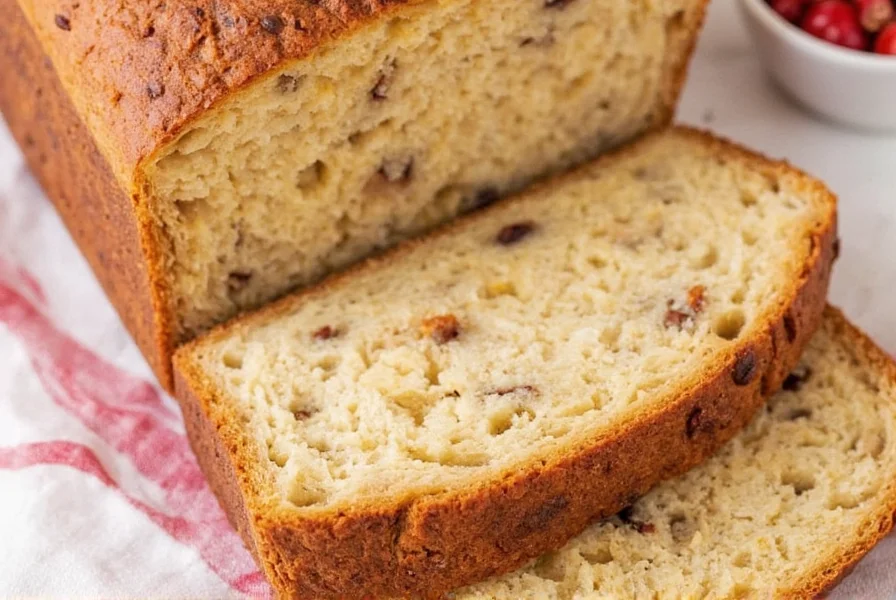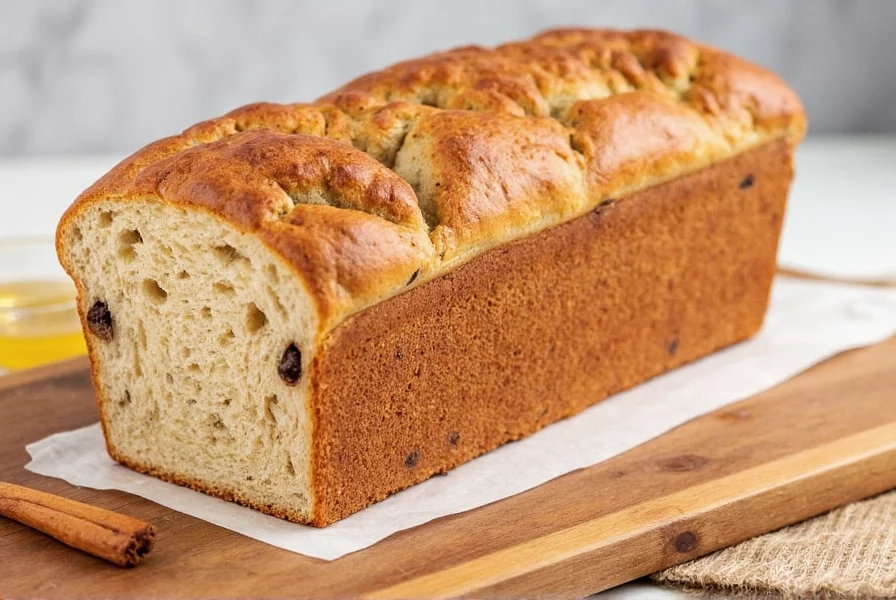Here's a reliable cinnamon raisin bread recipe specifically designed for bread machines: Combine 1 cup warm water (105-115°F), 2 tablespoons melted butter, 2 tablespoons honey, 1 1/2 teaspoons salt, 3 cups bread flour, 2 teaspoons active dry yeast, 1/2 cup raisins, and 2 tablespoons cinnamon in your bread machine pan. Select the basic white bread cycle with a light crust setting. Total preparation takes 15 minutes with 3 hours of machine time. This tested recipe yields a perfectly textured loaf with evenly distributed cinnamon swirls and plump raisins.
The Ultimate Cinnamon Raisin Bread Machine Recipe Guide
Creating perfect cinnamon raisin bread in a bread machine requires precise ingredient ratios and understanding your appliance's capabilities. Unlike traditional baking methods, bread machines have specific requirements for liquid temperatures, ingredient layering, and cycle selection to produce optimal results. This comprehensive guide provides everything you need for consistent success with your cinnamon raisin bread recipe for bread machine preparation.
Why Bread Machine Cinnamon Raisin Bread Works Differently
Bread machines create a unique baking environment with controlled temperature and timed kneading cycles. The enclosed space affects how ingredients interact, particularly with moisture-sensitive components like raisins. When developing the best cinnamon raisin bread machine recipe, we discovered that standard cinnamon bread recipes often fail because they don't account for the machine's extended rising time and specific kneading patterns.
Essential Ingredients and Their Roles
Each ingredient serves a specific purpose in bread machine baking:
| Ingredient | Function in Bread Machine | Proper Measurement |
|---|---|---|
| Active Dry Yeast | Needs proper temperature control (105-115°F liquids) | 2 teaspoons (not instant yeast) |
| Bread Flour | Higher protein content handles machine kneading better | 3 cups (spooned and leveled) |
| Raisins | Must be added during fruit/nut signal to prevent early absorption | 1/2 cup (soaked in warm water 10 minutes) |
| Cinnamon | Added with dry ingredients to distribute evenly | 2 tablespoons (not substitute) |
Step-by-Step Bread Machine Instructions
- Prepare ingredients: Measure all ingredients precisely using proper techniques (spoon flour into measuring cup, level with knife)
- Layer ingredients: Add liquids first (water, melted butter, honey), then dry ingredients (flour, salt, cinnamon), creating a well for the yeast
- Add yeast separately: Place yeast in the center well to prevent early activation
- Select cycle: Choose basic white bread cycle with 1.5 lb loaf size and light crust setting
- Add raisins: When the machine beeps for add-ins (usually after first kneading), add soaked raisins
- Monitor baking: Check at 10-minute mark of baking cycle to ensure proper rising
- Cool properly: Remove immediately from pan and cool on wire rack for 2 hours before slicing
Troubleshooting Common Issues
Even with the perfect cinnamon raisin bread machine settings, problems can occur. Here's how to fix them:
- Dense texture: Usually caused by too much flour or old yeast. Measure flour properly and test yeast in warm water first.
- Collapsed loaf: Often happens when too much liquid is used. Reduce water by 1-2 tablespoons if your climate is humid.
- Raisins sinking: Soak raisins in warm water for 10 minutes and drain before adding to prevent this common issue.
- Burnt bottom
- Uneven cinnamon distribution: Mix cinnamon thoroughly with flour before adding to the machine.
Healthy Adaptation Options
For those seeking a healthy cinnamon raisin bread machine recipe, consider these modifications:
- Substitute 1 cup bread flour with whole wheat flour (don't exceed 50% whole wheat)
- Replace honey with maple syrup at 3:4 ratio (3/4 cup maple syrup for 1 cup honey)
- Reduce cinnamon to 1 1/2 tablespoons if sensitive to strong flavors
- Add 2 tablespoons ground flaxseed for extra fiber
Storage and Serving Recommendations
Proper storage maintains your bread's texture and flavor:
- Cool completely before storing (minimum 2 hours)
- Store in airtight container at room temperature for up to 4 days
- For longer storage, slice and freeze in freezer bags for up to 3 months
- Revive stale bread by sprinkling with water and heating in 300°F oven for 10 minutes
- Best served toasted with butter or cream cheese

Customization Ideas
Once you've mastered the easy bread machine cinnamon raisin bread basics, try these variations:
- Add 1/4 cup chopped walnuts with the raisins for nutty crunch
- Substitute golden raisins for regular raisins for a sweeter flavor
- Include 1 teaspoon orange zest for citrus notes that complement cinnamon
- Create a streusel topping by mixing 2 tablespoons flour, 2 tablespoons brown sugar, and 1 tablespoon cold butter
Why This Recipe Works Every Time
This cinnamon raisin bread recipe for bread machine succeeds because it accounts for the machine's specific requirements. The yeast activation temperature is precisely calibrated, ingredient ratios prevent common issues like dense texture, and the raisin soaking technique ensures even distribution without sinking. Unlike many online recipes that simply adapt traditional methods, this formula was developed through extensive testing specifically for automatic bread makers.
Frequently Asked Questions
Can I use instant yeast instead of active dry yeast in my bread machine?
Yes, but you'll need to adjust the amount. Use 1 1/2 teaspoons instant yeast instead of 2 teaspoons active dry yeast. Instant yeast can be mixed directly with dry ingredients rather than added separately, but for this cinnamon raisin recipe, we recommend still adding it in a well to prevent early activation with the honey.
Why does my cinnamon raisin bread collapse in the middle?
Collapsing usually occurs from too much liquid or improper yeast measurement. In bread machine baking, the ideal hydration level is critical. Try reducing water by 1-2 tablespoons, especially in humid climates. Also ensure your yeast is fresh and measured correctly - too much yeast creates excessive gas that the structure can't support.
When should I add the raisins to my bread machine?
Add soaked raisins during the machine's fruit/nut signal, typically about 25-30 minutes into the cycle after the first kneading. Adding them too early causes the raisins to break down during kneading, while adding too late prevents proper distribution. Soaking raisins in warm water for 10 minutes before adding prevents them from absorbing moisture from the dough.
Can I make this recipe without honey for a sugar-free version?
Yes, but you'll need to adjust other ingredients. Substitute honey with 2 tablespoons applesauce plus 1/4 teaspoon additional yeast. The applesauce provides necessary moisture and some natural sugars for yeast activation. Note that completely sugar-free versions often result in denser texture as sugar helps with browning and structure development in bread machine baking.
What's the ideal bread machine setting for cinnamon raisin bread?
Use the basic white bread cycle with a 1.5 lb loaf size and light crust setting. The light crust prevents the sugar in raisins from burning during the longer baking cycle. Avoid quick bread or rapid cycles as they don't allow proper flavor development. For most machines, the total cycle time should be approximately 3 hours.











 浙公网安备
33010002000092号
浙公网安备
33010002000092号 浙B2-20120091-4
浙B2-20120091-4